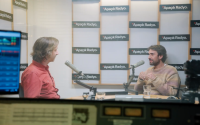The Progresive Magazine
By Matthew Rothschild, February 2009 Issue
Naomi Klein inherited some of her politics. Her grandfather was blacklisted by Joe McCarthy for being a union agitator at Walt Disney, where he worked as an animator. Her grandmother worked for Henry Wallace in 1948. Her father fled the United States as a Vietnam-era war resister and became a medical doctor and a member of Physicians for Social Responsibility. Her mother was a feminist filmmaker for Canada's National Film Board.
But upbringing is not destiny, and Klein has created her own. She was a student journalist and activist at the University of Toronto. She edited the leftist Canadian publication This Magazine. In 2000, she became an instant sensation when she published No Logo, which served as a manifesto for the anti-corporate, global justice movement. After that, she chronicled the rebellion against neoliberalism in Latin America. With her husband, Avi Lewis, she made a film called The Take, which is about autoworkers in Buenos Aires who occupy their idle factory.
A columnist for The Nation and The Guardian, Klein published the monumental book The Shock Doctrine: The Rise of Disaster Capitalism in 2007, which systematically refutes the claim that democracy and free markets are inseparable. In part, the book is a history of U.S. imperialism since the overthrow of Allende's Chile. And in part, it's an exposé on how Milton Friedman and the Chicago school of economics, the U.S. Treasury, the International Monetary Fund, and the World Bank all do the bidding of U.S. corporations and banks, especially in times of crisis.
Klein was recently profiled in The New Yorker, which called her "the most visible and influential figure on the American left—what Howard Zinn and Noam Chomsky were thirty years ago."
I spoke with her three days after Obama's election, just before she addressed an overflow crowd in Madison, Wisconsin, at a forum sponsored by the Madison Institute. Both in the interview and at her talk, I found her to be engaging, brilliant, and unflinching, yet funny and down to earth.
Q: What was your first reaction to Obama's victory?
Naomi Klein: Well, I made a really conscious choice that I was going to enjoy the night. Obviously, I'm keenly aware of what a centrist Obama is, and that there will be lots of disappointments to follow. But that doesn't negate the power of that evening. I have some really hard-core anarchist friends, and I told them, "Listen, you're not going to take this night away from me. I will not hear it the night of." I was in Washington, D.C., and it was a fantastic night in D.C. It was the night the service sector owned the city.
Q: How so?
Klein: That night I was walking to the apartment where my husband stays, and passing by this really elite, storied club. I always look in the window. It looks like the kind of place where Central American coups are plotted. On this night, a half hour after the results had been announced, there were these two African American men high-fiving each other outside the club. One of them was the doorman for this private club, and the other was a chauffeur for one of the club members. As I was passing, one of the club members came out looking just miserable. He was sort of a Daddy Warbucks character, with just an absolute scowl on his face. I watched these two men who had just been celebrating go back to their posts. One of them opened the door of the club, and the other opened the door of the waiting limousine. And they shared this smile. I just thought: Wow! This is a night where the people holding the doors are having a way better time than the people walking through the doors. And that's pretty rare in that city.
Q: What kind of movement do you think there is behind Obama, and how do progressives hold him accountable?
Klein: That remains to be seen. We're in uncharted territory here. The Obama machine is a very weird mix between the most elite Wall Street funding, and the most grassroots, small scale, community organizing models. These two forces brought Obama to power.
Q: Is the community organizer going to win out, or is the collector from Wall Street?
Klein: When you ignite that kind of energy, you can't necessarily control it. But the Obama campaign has the list. And he is sending a mixed message: He's saying I'm going to need you. But what does that mean? Is he going to call rallies of hundreds of thousands of people to put pressure on him? No sitting Presidents call rallies to protest themselves. So there has to be a way to break free from that electoral machine.
Q: What do you make of this group of corporatists and Clinton retreads that are surrounding Obama on the economic front?
Klein: I would say it's disappointing, but we don't have a right to be disappointed. This is who surrounded Obama during the whole campaign. He's been taking advice from Larry Summers and Bob Rubin and Paul Volcker all along. He opened up the circle a little bit to people like Joseph Stiglitz and Robert Reich. But to me it's just shocking—and I know we shouldn't be shocked—that Larry Summers is [a leading economic adviser]. And even more shocking to me—and I don't know how to say this in a politically correct way—is that the main thing that people are objecting to is what Summers said at Harvard about women's aptitude in science. It was an offensive thing to say, and he lost his job for it. But that, to me, is so much less of a crime than the fact that he was the main architect in Treasury for the shock therapy in Russia that impoverished sixty million people—and did a lot of harm to women. He cheer led Boris Yeltsin as he attacked the Russian parliament, dissolved democracy, and suspended the constitution.
And Summers played a key role in the shock therapy in Thailand and South Korea in 1998. So he has a dismal track record. He was standing by Clinton's side when Clinton abolished Glass-Steagall, which is the key piece of legislation that would have prevented the financial crisis we're in now. He fought tooth and nail alongside Alan Greenspan to prevent the derivatives industry from being regulated.
The reason I'm so upset about this is because we're paying the price for the deliberate amnesia that so many of us signed onto during the Bush years, where we were allowed to say whatever we wanted that was critical about U.S. policy, even about the free market, if we said it all started in 2001, when Bush took office.
Obama's campaign was the ultimate example of this. "This crisis that we're seeing is the result of the deregulation policies that have been in place for the past eight years." No, not eight years! The key pieces of legislation were passed under Clinton. We all turned the other way, and we allowed these lies to be repeated. And we thought, we'll just get rid of Bush, and let them have their strategy. Well, this is the result of that strategy: Larry Summers is treated like the savior of the economy.
Q: Obama is an intelligent man. Surely, he knows this litany. So why do you think he is lining up with people like Summers? Is that where he is politically? Or is he trying to please the pundits and the power establishment? Is he trying to please Wall Street?
Klein: Politicians don't take the kind of bold risks that we really need in this moment. People are talking about the need for a green New Deal, and comparing this moment to the early 1930s, and they're right. But what led FDR to take those risks and be that bold was that he was under enormous pressure from grassroots movements from below. In the absence of that, Obama's under tremendous pressure not to shock the system.
I don't think we should play down the fact that the market plunged after Obama was elected, and that's incredibly traumatic for a leader. In a time of market volatility, there are very few political leaders who can withstand watching that. If he were to have appointed Joseph Stiglitz as Treasury Secretary, the market would have plummeted. The market wants continuity. The market wants to know it's the same club.
Q: By the way, how did you react to Alan Greenspan's confession that he'd found a flaw in his theory?
Klein: This is an amazing moment for the left, for progressives. Because the free market ideology is truly in crisis. Greenspan said he believed the banking industry could self-regulate because trust and reputation are important assets in the market. What he didn't calculate for is just greed. That's a completely implausible story. This is a man who was an Ayn Rand protégé. His whole philosophy was that greed is the primary driving force in all of humanity. So how could Alan Greenspan be surprised by greed? The prime regulator of the global economy for eighteen years did not calculate that bankers might be greedy?
Q: What's your critique of the bailout of the banks?
Klein: This bailout was the Bush Administration's last trough. Like the Iraq War, it was a cash machine, where private companies withdraw funds and pay them back in the form of campaign contributions. The Bush Administration cut an incredibly bad deal with the banks. We know how bad it is because five days earlier Britain's Gordon Brown negotiated a deal to purchase equity in exchange for a capital injection. He got a 12 percent return, a seat on the board, voting rights, and he got guarantees that they would use the capital injection to lend money to small businesses and homeowners. So, five days later, Henry Paulson comes up with his terms: 5 percent as opposed to 12 percent, no voting rights, no seats on the board, and no guarantee that the money will be spent doing what they said it was intended to do: to get lending going.
The stakes are so huge. Think about $700 billion that we're just throwing away. Then the right turns around and says, "About all that 'yes, you can' stuff, No, you can't. We're broke."
We all have a huge stake in stopping this heist.






